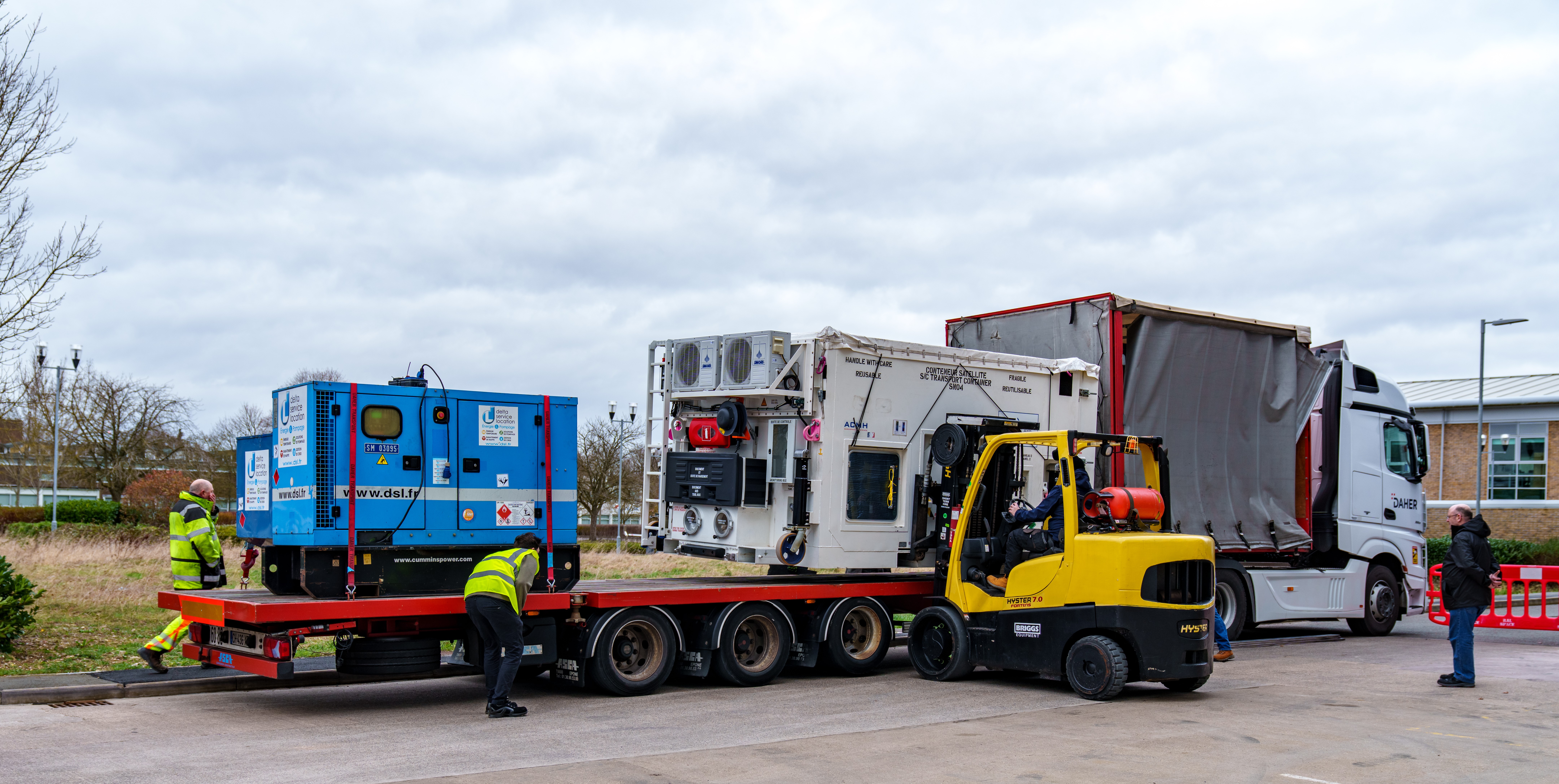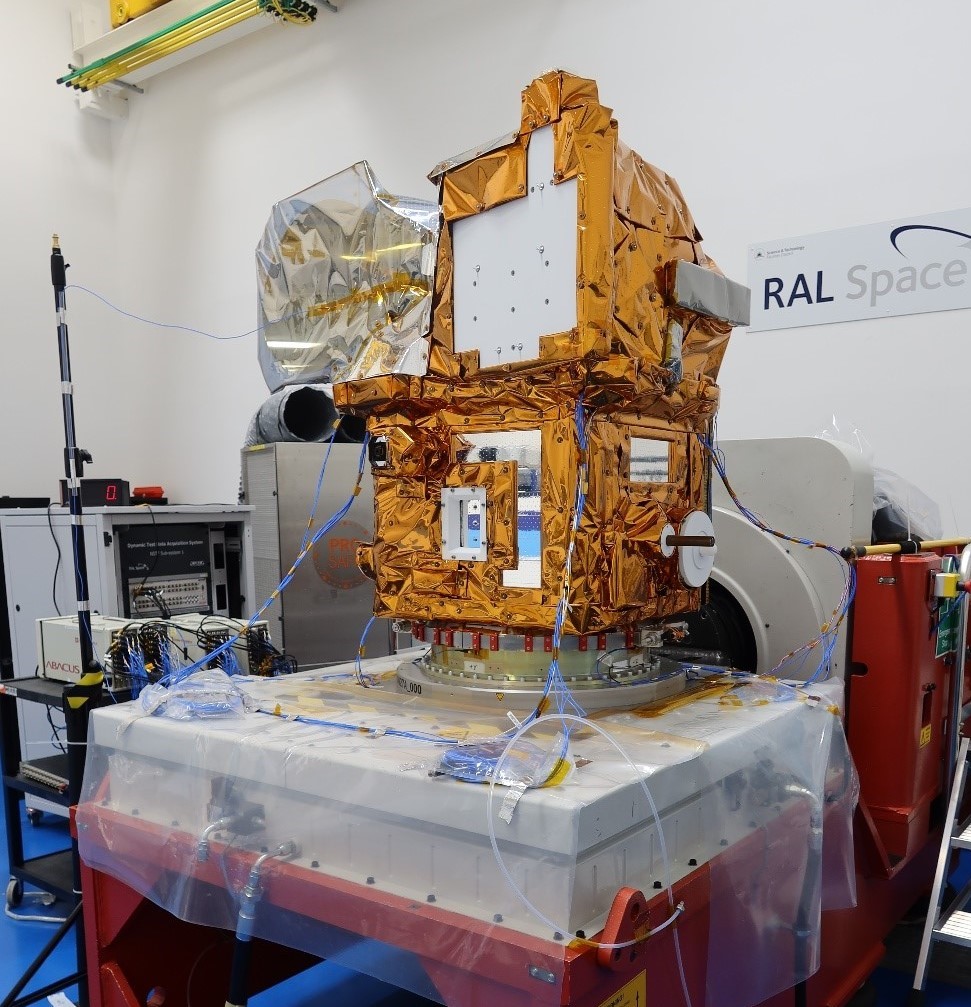
MicroCarb leaves Harwell’s RAL Space ready for launch
After spending just over a year at RAL Space at Harwell Campus, MicroCarb has been delivered from Oxfordshire to Toulouse, where it will stay before being shipped for launch.
Climate change is an increasingly pressing issue, yet a lack of data currently makes it difficult to measure how much carbon dioxide (CO2) – the principal greenhouse gas – is absorbed by and released into the atmosphere. MicroCarb is the first European mission designed to quantify sources and sinks of CO2 to gain deeper insights into our impact on the carbon cycle and inform future climate models.
The satellite arrived at RAL Space in December 2022 ahead of a successful assembly, integration and test campaign led by Thales Alenia Space in the UK. This involved a series of vibration, shock and thermal vacuum tests supported by RAL Space facilities and testing teams. Now, successfully qualified for space, MicroCarb will be temporarily stored at Thales Alenia Space’s facility in Toulouse before launch preparations begin.

MicroCarb undergoing vibration tests at RAL Space. Credit: CNES / Benoit Cerantola
MicroCarb’s arrival in 2022 wasn’t the first time RAL Space had encountered the mission, which is a collaboration between the UK Space Agency and the French space agency, CNES. RAL Space worked with partners to design, qualify and deliver the satellite’s Pointing and Calibration System (PCS), which is crucial for the spacecraft to measure reliable and accurate data, and also provided the multi-layer insulation for the satellite to ensure it will endure the extreme temperature environment of space.
Dr Sarah Beardsley, Director of STFC RAL Space, said:
“Teams across RAL Space have worked on MicroCarb for many years, from the design and build of the Pointing and Calibration System and Multi-Layer Insulation, to more recently supporting Thales Alenia Space with their successful test campaign using our facilities.
We’re delighted to see the satellite one step closer to space and are thrilled for our colleagues and partners who have worked so hard to achieve this crucial milestone.”
Andrew Griffith MP, Minister for Space at the Department for Science, Innovation and Technology, said:
“MicroCarb’s advanced technology will deliver invaluable and precise data on our planet’s carbon dioxide levels and marks the latest exciting innovation by the UK’s ground-breaking space sector in collaboration with our friends in France.
“Once operational it will inform businesses and decision-makers around the world on the role they can play in tackling climate change and as the technology develops, open new avenues for UK businesses that grow our economy.”
Dr Paul Bate, Chief Executive of the UK Space Agency, said:
“MicroCarb’s departure to France is an exciting next step in its journey to space, where it will gather crucial information to improve our understanding of the carbon landscape on our planet and the impact of carbon dioxide, which is the main greenhouse gas caused by human activity.
“Over half of the critical measurements on climate change rely on satellite data and it’s a testament to the expertise of UK scientists and engineers – both at Harwell Space Cluster and across the country – that we are playing a central role in such an important mission.”
Related news
-

Oxford Ionics successfully installs QUARTET, a state-of-the-art quantum computer, at NQCC’s Harwell data centre
Oxford Ionics, a world leader in trapped-ion quantum computing, today announced that it has delivered and installed a full-stack quantum computer, called QUARTET (QUantum Advantage-Ready Trapped-ion Exploration Testbed), to the UK’s National Quantum Computing Centre (NQCC). The NQCC is the UK’s national laboratory for quantum computing, focused on conducting critical applications research with partners across…
-

Oxford Space Systems successfully deploys VHF Isoflux Helical antenna for Startical’s ECHOES Project
Oxford Space Systems is pleased to announce the successful in-space deployment of its large Very High Frequency (VHF) isoflux helical antenna on the IOD-2 mission for Startical’s ECHOES project, marking a significant milestone in the advancement of space-based air traffic management (ATM). The antenna, nearly 4 metres in length and designed to operate within the…
-

BAE Systems to Build on AI Pedigree Through Investment in Harwell Start Up Oxford Dynamics
BAE Systems has made a strategic investment in Oxford Dynamics, a Harwell based deep-tech start-up specialising in artificial intelligence (AI) and robotics, as part of its ongoing drive to identify and harness innovative technologies for rapid deployment. The collaboration will see BAE Systems combine its defence and security knowledge with Oxford Dynamics’ AI driven data…